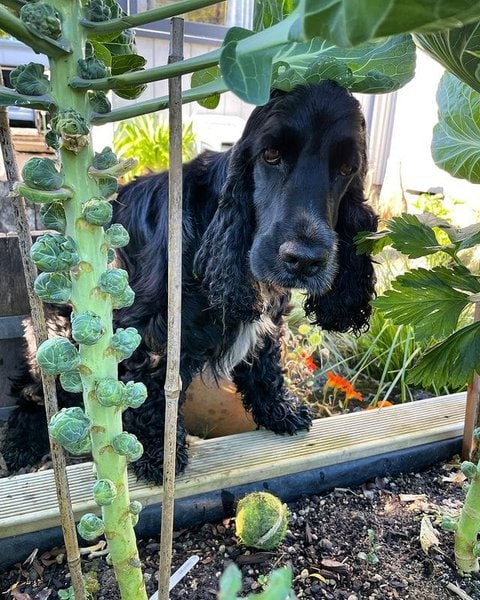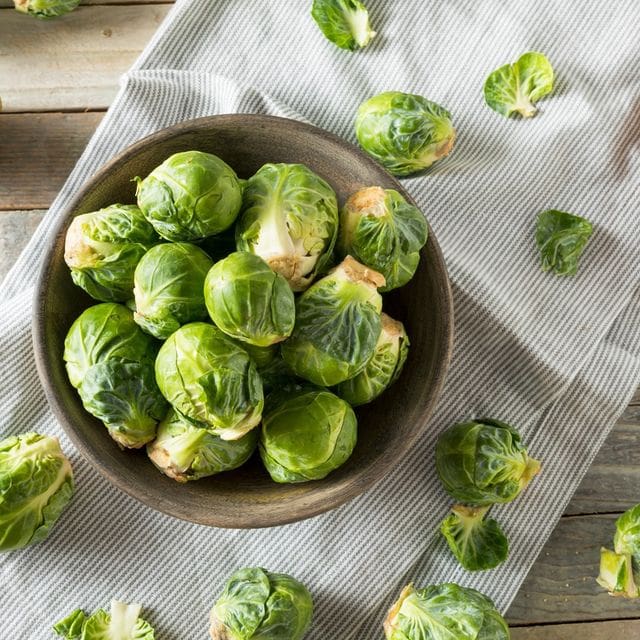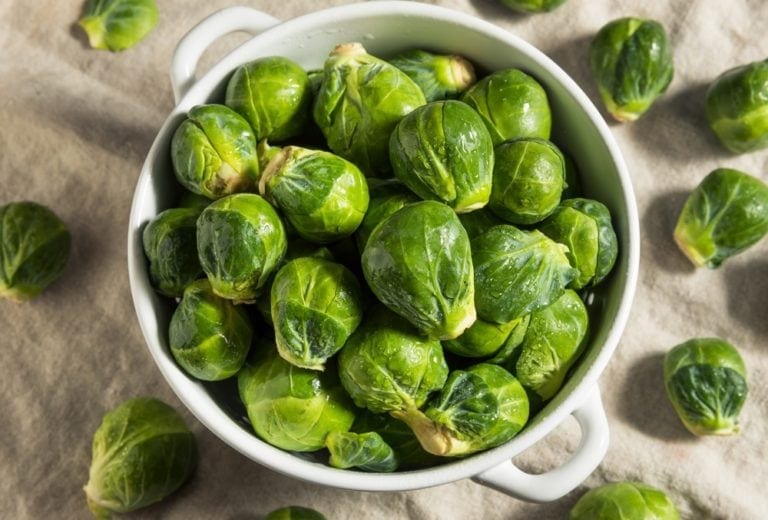Brussels sprouts have gone through a rollercoaster of dislikes and likes among humans. But, if you accept their nutritional benefits and love to eat them, you would also like to feed your canine this amazing veggie, right? But is it safe for your buddy to eat Brussels sprouts?
Yes, your dog can eat Brussels sprouts, and it will be nutritionally helpful for the pup, just like for humans. Brussels sprouts contain every vitamin, mineral, and fiber essential for your puppy. This vegetable is also suitable for obese dogs as it boosts the metabolism, which causes the fats to burn quickly.
But there is a limitation to feeding this vegetable to your pup. Here in this article, we will tell you all the reasons why you should provide Brussels sprouts to your dog and the reasons why you shouldn’t. So, let’s jump right into it!
Why Does My Dog Love Brussels Sprouts?

Dogs love Brussels sprouts because they are small and easy to swallow. This vegetable is also a great source of vitamins, minerals, fiber, and antioxidants.
You can feed your dog Brussels sprouts once a day to boost their immune system and make the bones healthy and strong. Here we will discuss these nutritions about how it is vital for your furry partner.
Vitamins
Vitamins are essential for your pup as they regulate different functions, and Brussels contains all vital vitamins that help maintain a healthy metabolism. Here’s what each vitamin in these miniature cabbages does to your dog’s body.
Vitamin A
It is well-known for its role in the retina. It helps to improve your dog’s eyesight, especially your canine’s capability to see in the dark. It also helps to enhance the nervous system’s proper functioning, keeping your buddy’s mental health fit. Also, vitamin A is essential to keep their heart, lungs, liver, and other body parts in sound working.
Vitamin B
It is also found in Brussels sprouts. Here vitamin B1 and B6 are present, both great for your pup. B1 is used for carbohydrates metabolism, and it is essential for your dog’s brain and other high-energy organs.
B6 is way more important than B1. B6 is vital for generating glucose in the body, and it maintains red blood cells and the nervous system functioning. It also regulates hormones in the body and controls the immune response to threatening microbodies.
Lastly, it is also essential for gene activation, making Brussels sprouts suitable for pregnant dogs.
Vitamin C
Vitamin C acts as an antioxidant in Brussels sprouts that eliminates harmful free radicals. It also helps collagen formation, lowering any joint disease and spinal disorders. It is also an immune booster and reduces inflammation.
Vitamin E
It also acts as an antioxidant and maintains proper cell functioning. This fat-soluble vitamin is also responsible for fat metabolism.
Minerals
Brussels sprouts contain many major and trace minerals essential for your pup’s body metabolism, organ functioning, and energy production. Some of the most vital minerals are discussed below:
Iron
In Brussels sprouts, iron is necessary for energy production, and red blood cells require iron for hemoglobin to carry oxygen to all the body cells. Also, some specific enzymes in your fluffy pal’s body require iron for complete functioning.
Magnesium
It is responsible for energy transfer. So, magnesium is used when your dog walks, barks, or moves any muscle—even involuntary actions like heartbeat and lungs movement while breathing also needs magnesium. Moreover, thinking also consumes magnesium for nerve signaling.
Manganese
Manganese helps to absorb and digest carbohydrates and aids in protein metabolism. It also enables enzymes to convert your canine’s food to fatty acids and energy. It aids in developing strong ligaments and supports the skeletal system. Moreover, it makes your champ’s kidney and liver work in the best conditions.
Phosphorus
It is found in the bones and teeth of your dog in companion with calcium. It provides energy at the cellular level. And it is also an integral component of the DNA and RNA of your friend.

Dietary Fibers
Dietary fibers are crucial for bowel movement, and they regulate the alimentary canal functions, particularly the colon’s health. Brussels contains a considerable amount of dietary fibers that can reduce the risks of many gastrointestinal diseases.
They can lower the chances of constipation and colon inflammation (colitis). Fibers also lower diabetes and obesity risks by many folds. But this high fiber concentration also results in some side effects that we will mention in the article later.
Antioxidants
Brussels also contains antioxidants other than vitamins, like kaempferol, essential in preventing chronic diseases. Kaempferol reduces inflammation in the organs and prevents cancer cell growth in the body. It also helps to maintain blood circulation and boost heart health. Again, it stops oxidative damage to muscle tissues.
Weight Loss
The fiber in the sprouts also reduces the meal digestion time of your dog. As a result, the food takes time to convert into energy and prevents your dog from begging for meals. Lower food intake also lowers your dog’s weight, thus preventing obesity.
Low Calories
Brussels sprouts are low in calories. So, you fluffy pal won’t get fat and gain extra weight. Too many calories cause weight gain and are not so good for canines. You don’t need to worry about it while feeding this sprout meal.
Even with the many benefits of Brussels sprouts, there is a limit to its daily intake. You can’t feed just Brussels to your pup or give a big treat every day. Small dogs require ½ or a piece, while the larger dogs can eat up to five pieces. You should be careful in the amounts as overeating may cause some complications.
Side Effects
A large amount of fiber in them is beneficial as well as a problem for dogs. First, if you feed your dog these tiny cabbages, you must keep an air freshener ready because the increased colon activity produces a lot of gas. Now, this is a bad problem.
The fibers build bacteria in intestinal cavities that aid in digestion. These bacteria produce a lot of gas during the fermentation of food. So, you can’t close the windows after you feed your champ with these sprouts.
Moreover, some dogs are sensitive to the high fiber amount. So their body reacts accordingly, and your pup can have loose stools, more likely a chance of diarrhea. Some may also be choosy in the diet and don’t even like this veggie, just like humans.
Plus, some dogs are allergic to Brussels sprouts and show symptoms quickly. The symptoms are as follows.
- Diarrhea
- Itching
- Fever
- Nausea or vomiting
- Lethargy
If you observe any of these side effects, stop feeding the sprouts and consult your nearest vet.
How To Check For Dislikeness Or Allergy In Your Dog?
To check whether your dog likes the Brussels sprouts, give a small ball of it. If your canine eats it without any hesitation, then your pup likes it. The next meal may even cause your dog to drool or jump, leaping over you. However, if your pup smells it for a while and leaves or plays with it, it’s a dislike.
Can Dogs Have Cooked Brussels Sprouts?

Cooked Brussels sprouts have all the nutrition-packed, and also your pup will like the soft texture. So, the best way to offer this treat is to cook it without any seasoning.
No matter how much your tongue loves the taste of onion, garlic, or salt, they are poisonous for your furball. Here are some of the other ways of feeding your dog this veggie.
Raw
You can feed your canine raw Brussels sprouts, but there is a chance of choking. However, a limited amount won’t be harmful. Choose the fresh pieces for your pup. They shouldn’t have any brown leaves or wilted, and you can’t even feed any rotting Brussels.
Steamed
Steamed Brussels sprouts are also a delicious option. Like the cooked ones, steamed or roasted Brussels sprouts pack all the nutritional ingredients your champ will need. You can steam them with other safe veggies and make a salad but first, ask a vet.
It is recommended not to boil Brussels sprouts, as most of the nutrients will dissolve in water. Note that steaming and boiling are two different things.
Can Dogs Eat Brussels Sprouts Leaves Or Stalk?
As the other parts of Brussels sprouts are concerned, you can’t feed their stalk to your pup. They are highly fibrous and harmful for small dogs. But you can provide your dog with their leaves. Dogs are less likely to suffer from gas after eating Brussels leaves than the whole raw veggie.





